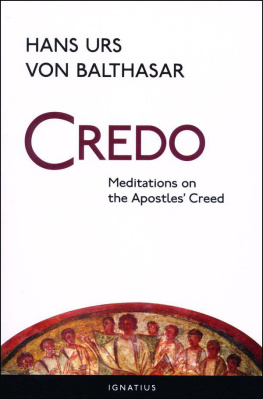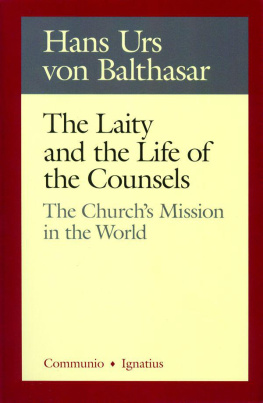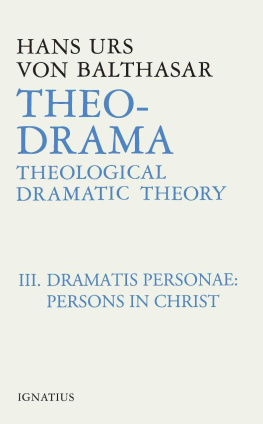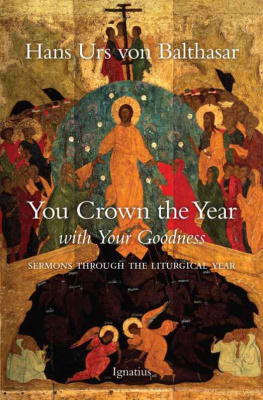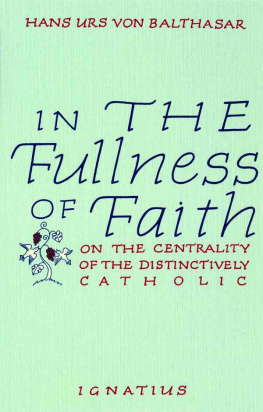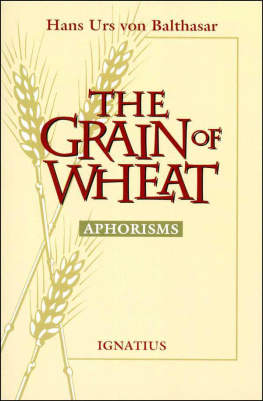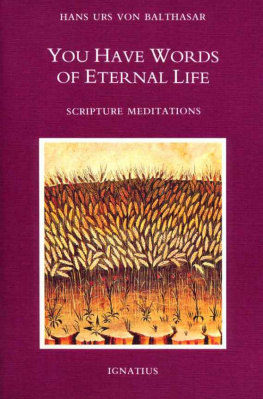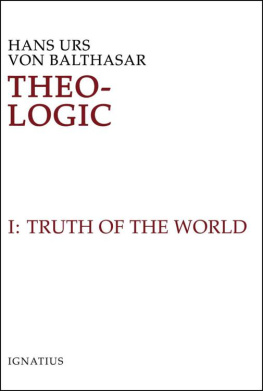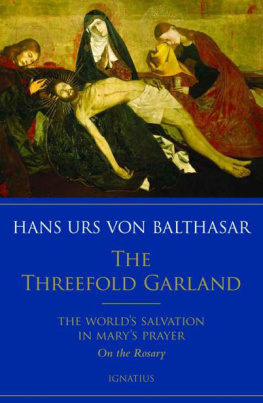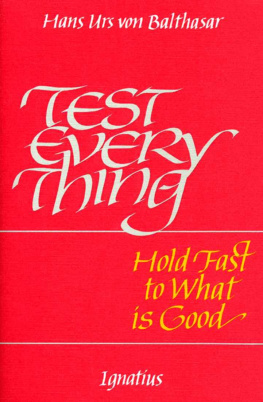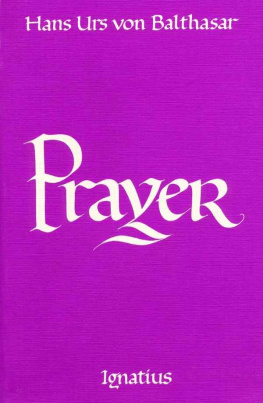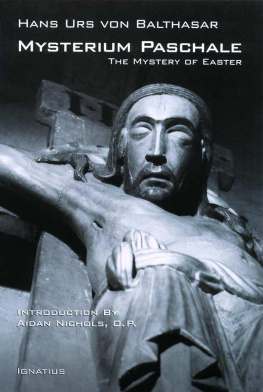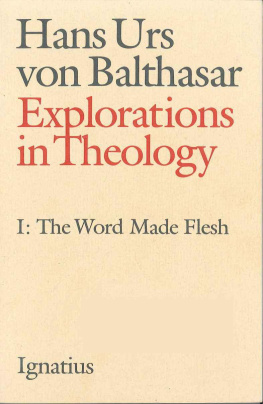CREDO
Meditations on the Apostles Creed
CREDO
Meditations on the Apostles Creed
Hans Urs von Balthasar
Introduction by Medard Kehl, S.J.
Translated by David Kipp
IGNATIUS PRESS SAN FRANCISCO
Original German edition:
Credo; Meditationen turn Apostolischen Glaubensbekenntnis
1989 by Verlag Herder, Freiburg im Breisgau
English translation copyright 1990 by
The Crossroad Publishing Company
All rights reserved
No part of this publication may be reproduced, stored in a retrieval system, or transmitted, in any form or by any means, electronic, mechanical, photocopying, recording or otherwise, without the prior permission of T & T Clark.
Cover art:
Christ and the Apostles
Early Christian fresco
Catacomb of S. Domitilla, Rome, Italy
Scala / Art Resource, New York
Cover design by Roxanne Mei Lum
Published by Ignatius Press 2000, 2005
ISBN 978-0-89870-803-5
ISBN 0-89870-803-6
Library of Congress Control Number 00-100817
Printed in the United States of America
Contents
I believe in God the Father Almighty
And in Jesus Christ, His only Son our Lord
Conceived by the Holy Spirit, born of the Virgin Mary
Suffered under Pontius Pilate, died and was buried, descended into hell
The third day arose again from the dead
Ascended into heaven, He sits at the right hand of God Almighty
From thence He shall come to judge the living and the dead
I believe in the Holy Spirit
I believe in the holy, catholic Church, the communion of saints
The forgiveness of sins
The resurrection of the body
And life everlasting. Amen
Introduction
I n 1988, over a period of twelve months, the pastoral bulletin for the German dioceses of Aachen, Berlin, Essen, Hildesheim, Koln, and Osnabriick published, each month as its leading article, one then another of some brief interpretations of the twelve articles of the Apostles Creed that were written by the Swiss theologian, Hans Urs von Balthasar. Although he himself may not, perhaps, have conceived them as such when writing them, these texts, which are undoubtedly among the last things to be written by him, nevertheless take on the character of a legacy in view of his sudden death on 26 June 1988. For they amount, in their extraordinary compactness and depth, to a little summa of his theology. What he has set out in detail, over five decades, in the now barely surveyable manifoldness and breadth of his truly catholic thoughtthat is, thought that draws its sustenance from the inexhaustible fullness of the self-revelation of God and thus transcends all confessional narrownesshe summarizes once again here in contemplative plainness and simplicity.
After having tirelessly pursued the many pathways and tracks, however winding, of the incarnate love of God in our world, he now returns, at the end, to that center of our reality from which all things spring: to the Mystery of the threefold God. The astonished, grateful gaze of one who, out of adoration for this Mystery, knows himself called to theological thought and research remained with him to the end; never was he simply finished with the subject matter of his theology, never was he able to finalize documentation of a theological system based on it, never did his looking become a knowing, self-comforted seeing through. Precisely this unclouded, almost childlike joy in the richness and beauty of that Mystery which entices and attracts our faith constantly anew is evidenced in his interpretation of the creed. My comments in this introduction are aimed at directing the readers attention primarily to the characteristic feature of those meditations, namely, to:
The Trinitarian Stamp of Faith
The preeminent value of this exposition of the creed, which sets it apart from other similar attempts, lies in the consistently reasoned and inter-balanced way in which von Balthasar brings out the trinitarian structure of the Christian faith, both as a whole and as unfolded in the twelve articles of faith. The sign of the Cross, which, from baptism onward, brings the believers entire life under the name and benediction of the threefold God, thus also stands, from the very start, as a foretoken of his explicit profession of faith in this God, a foretoken that illuminates not only the inner unity of the three-part profession, but also the deepest meaning of each individual statement of faith. Without lengthy introductions and guiding commentaries, without much seeking after understandable links to the sphere of faiths natural experience, von Balthasar moves immediately into the center: that Christian faith is nothing other than allowing oneself to receive what is bestowed by that God who, in his essence, is love and surrender (29).
In his essence: This means that God does not need the finite world before he can be love and surrender, but is always such in his very self: an inexhaustible relational process of reciprocal self-surrender between Father, Son, and Spirit. The unity of this God is not, therefore, the unity of a consciousness and will related purely to itself, nor the unity of some natural, cosmic life-force, but the unity of love; and in fact, understood as a (supratemporal) process involving an original source of love that bestows itself infinitely (Father), a self-declaration of love that receives and gives itself back infinitely (Son), and a love that binds together infinitely, bringing giving and receiving into accord and effecting their overflow into creation infinitely (Spirit). To render the history of redemption transparent in relation to this primal process is probably the deepest concern of the whole of von Balthasars theology. This can also be easily demonstrated by the particular steps in his interpretation.
It begins with the matter of correctly understanding God the Father Almighty : his almightiness lies not (as often imagined by us) in being able to do this or that as he chooses, but in the unlimited and free power of his surrender, which can bring forth an Other in God, namely, the Son as a counterpart who is equally essential and equal in love and power (31). In the Holy Spiritthe personal fruit of this loveGods almightiness transcends itself in the direction of creation, which therefore owes its being entirely to the effect of the threefold God. Its meaning , after all, lies solely in the mutual glorification of Father and Son in the common Spirit of love (32), and its being made possible solely in that Other, who lives in God himself and consequently affords both scope and surety for the successful outcome of the created other (39). The world can be created only in the Son, who is thusprecisely in view of the possibility and actuality of the worlds no to the Creatoralso simultaneously the guarantor for the success of the venture (39). In full freedomhaving, as it were, been granted permission to accept the Fathers requestthe Son assumes, from eternity, his destiny as mediator, archetype, and savior of creation (39-40) in order to carry it out, historically, in the Incarnation and, in the sanctifying power of the Spirit, to draw all creatures into his unique relationship with the Father. Only in that way can we join in his gratitude ( eucharistia ) and supplication and be entitled to pray the Our Father.
Here, a further theme of the interpretation, which can be illuminated only in trinitarian terms, announces itself: the Sons obedience . This by no means stands in contradiction to his freedom and love, for in obedience the Sons inner-trinitarian essence expresses itself in an appropriately creaturely way. As love that continually receives itself from the Father and owes itself to him, he also always accepts, with full consent, his being sent to the world, and allows himself to undergo his passive conception by the Holy Spirit and his birth of the Virgin Mary (45). Freely assenting obedience, as the form of creaturely freedom and love that is appropriate to the eternal Son, will thenceforth stamp the whole path of the earthly Jesus and of those who follow after him.

